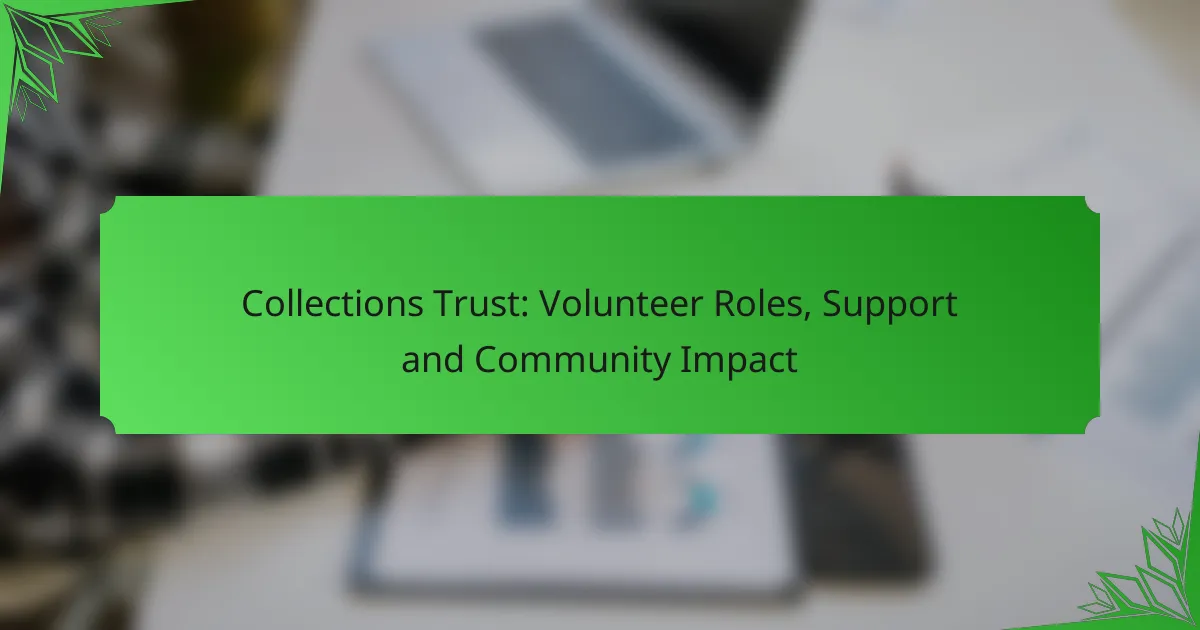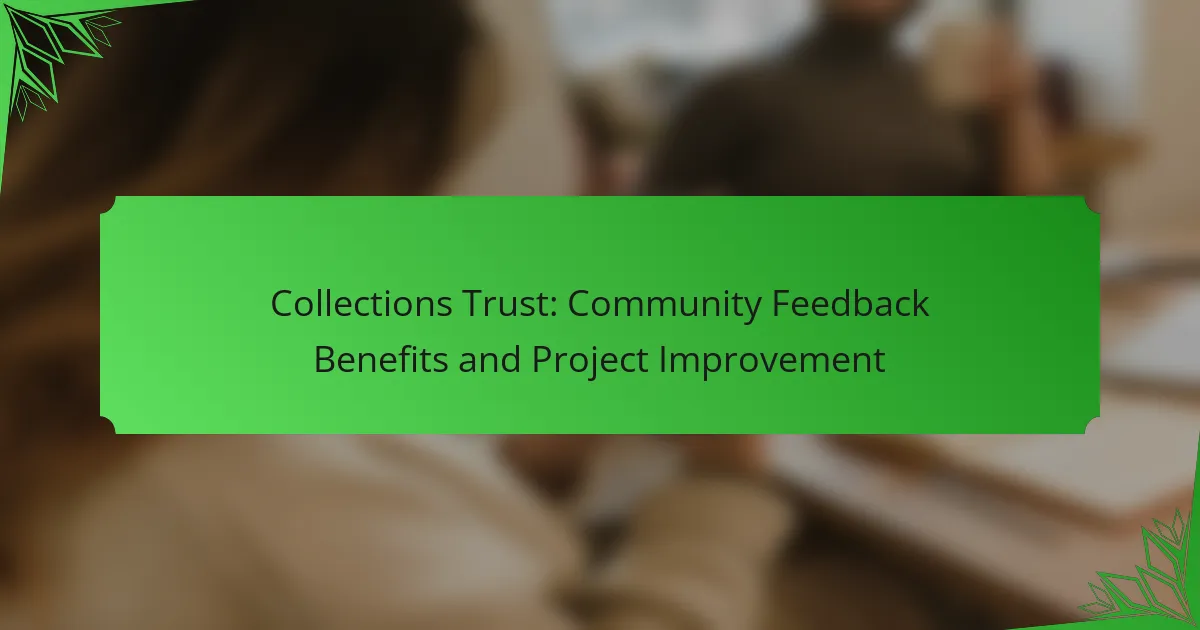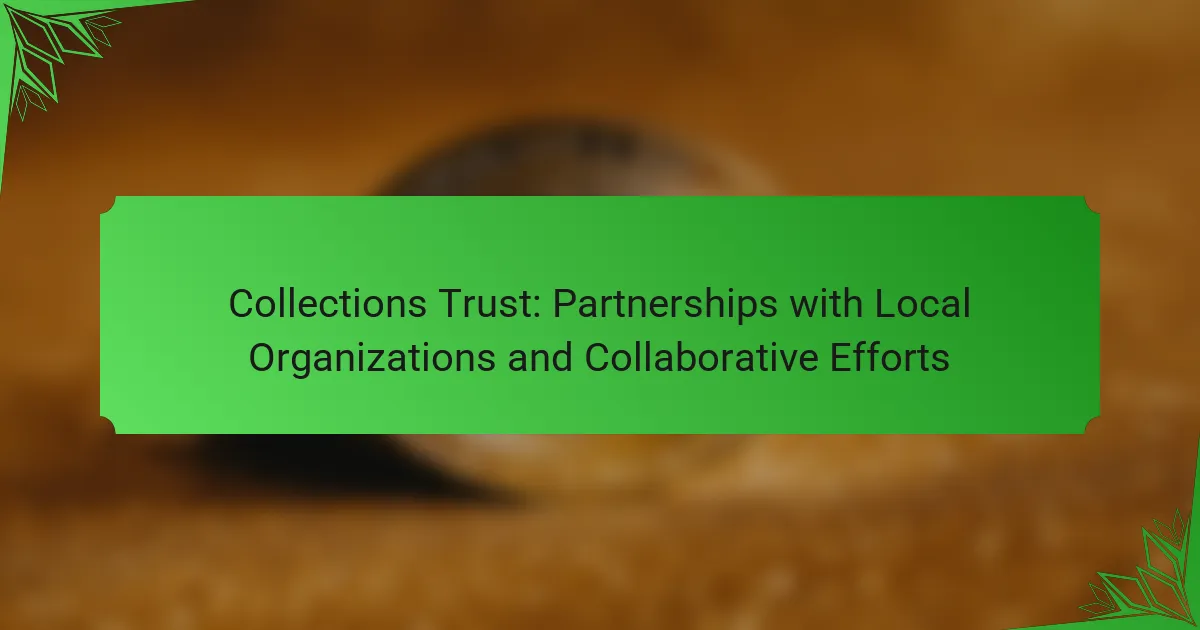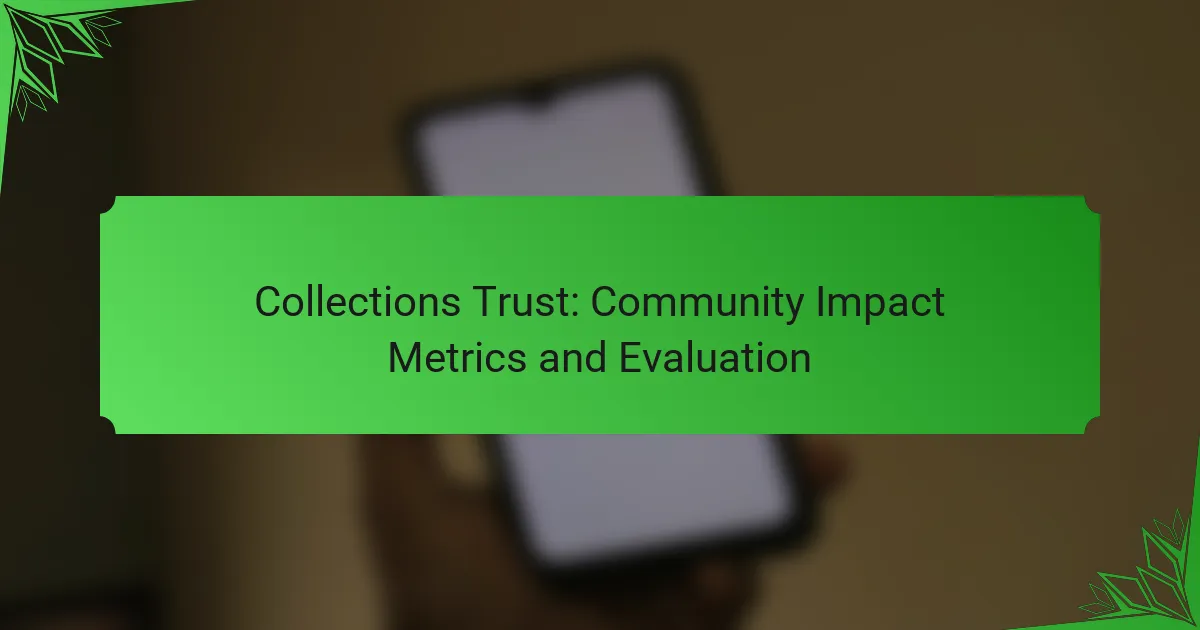Collections Trust offers diverse volunteer roles that align with various skills and interests, enabling individuals to play a vital part in preserving and managing cultural heritage. By participating in training sessions, community events, and social media initiatives, volunteers enhance community engagement and support the organization’s mission. These opportunities not only foster a deeper appreciation for local heritage but also empower individuals to make meaningful contributions to their communities.
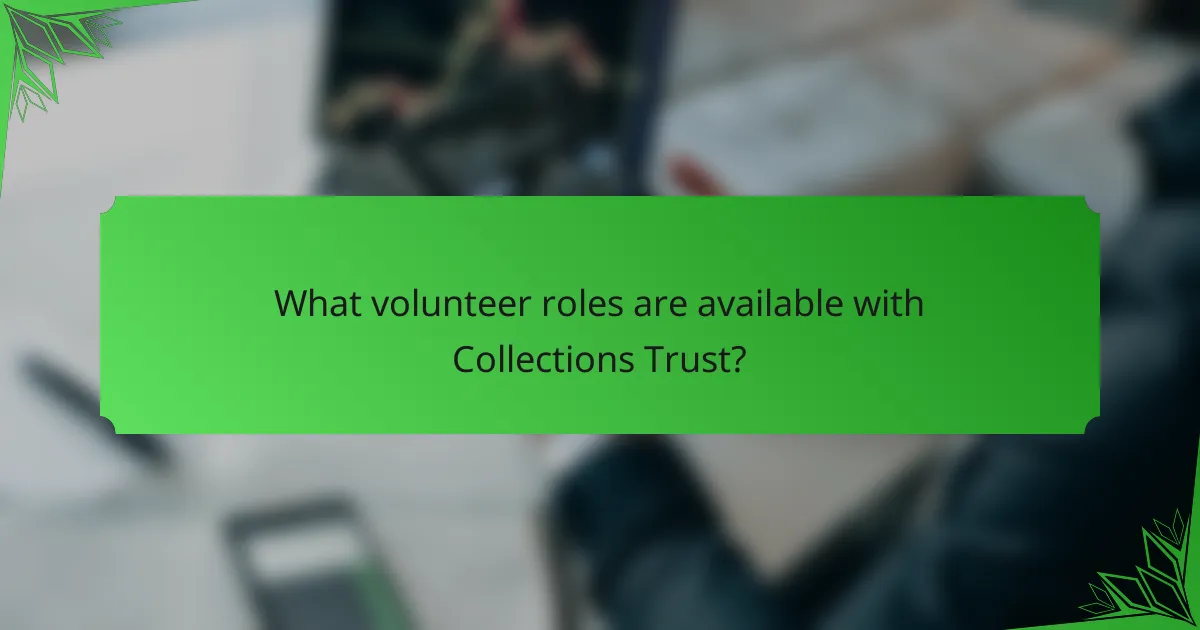
What volunteer roles are available with Collections Trust?
Collections Trust offers a variety of volunteer roles that cater to different skills and interests, allowing individuals to contribute to the preservation and management of cultural heritage. Each role focuses on specific tasks that support the organization’s mission and enhance community engagement.
Community Engagement Volunteer
The Community Engagement Volunteer role focuses on building relationships between Collections Trust and local communities. Volunteers in this position help organize outreach activities, workshops, and events that promote awareness of cultural collections.
To be effective, volunteers should possess strong communication skills and a passion for community involvement. Engaging with diverse groups can enhance the impact of the organization’s initiatives and foster a sense of belonging.
Collections Management Assistant
As a Collections Management Assistant, volunteers support the cataloging, preservation, and organization of collections. This role may involve data entry, inventory checks, and assisting with the maintenance of collection records.
Attention to detail is crucial in this position, as accurate documentation ensures the integrity of the collections. Volunteers should be comfortable using databases and have a basic understanding of collections management practices.
Event Coordinator Volunteer
The Event Coordinator Volunteer is responsible for planning and executing events that promote the Collections Trust’s mission. This can include exhibitions, talks, and community gatherings that highlight the importance of cultural heritage.
Successful event coordinators are organized and creative, capable of managing logistics, budgets, and marketing efforts. Experience in event planning can be beneficial, but enthusiasm and a willingness to learn are equally valuable.
Education Program Volunteer
Education Program Volunteers assist in developing and delivering educational programs related to the collections. This role involves creating engaging content for workshops, school programs, and public lectures.
Volunteers should have a background in education or a strong interest in teaching. Collaborating with educators and cultural professionals can enhance the effectiveness of the programs offered.
Research Volunteer
Research Volunteers contribute by conducting research on specific collections or topics relevant to the Collections Trust’s mission. This role may involve compiling information, writing reports, and assisting with grant applications.
Strong analytical skills and a passion for research are essential. Volunteers should be comfortable using various research tools and resources to gather accurate and relevant information.

How can I support Collections Trust as a volunteer?
You can support Collections Trust as a volunteer by engaging in various activities that enhance community involvement and promote cultural heritage. Opportunities include participating in training sessions, attending community events, and promoting initiatives on social media.
Participate in training sessions
Participating in training sessions is a vital way to support Collections Trust. These sessions equip volunteers with the necessary skills and knowledge to effectively contribute to the organization’s mission. Training typically covers topics such as collections management, community engagement, and best practices in preservation.
Look for training opportunities that fit your schedule, as they may be offered in various formats, including in-person workshops or online webinars. Engaging actively in these sessions can enhance your understanding and ability to make a meaningful impact.
Attend community events
Attending community events organized by Collections Trust allows you to connect with other volunteers and community members. These events often include exhibitions, workshops, and discussions that highlight the importance of cultural collections. Your presence can help foster a sense of community and encourage others to get involved.
Check the Collections Trust website or local community boards for upcoming events. Participating in these gatherings not only supports the organization but also enriches your own experience and understanding of local heritage.
Promote initiatives on social media
Promoting Collections Trust initiatives on social media is an effective way to raise awareness and engage a broader audience. Sharing posts, events, and success stories can help attract new volunteers and supporters. Use platforms like Facebook, Twitter, and Instagram to amplify the organization’s message.
When promoting, consider using relevant hashtags and tagging the organization to increase visibility. Engaging with followers by responding to comments and sharing personal experiences can further enhance community connection and support for Collections Trust.
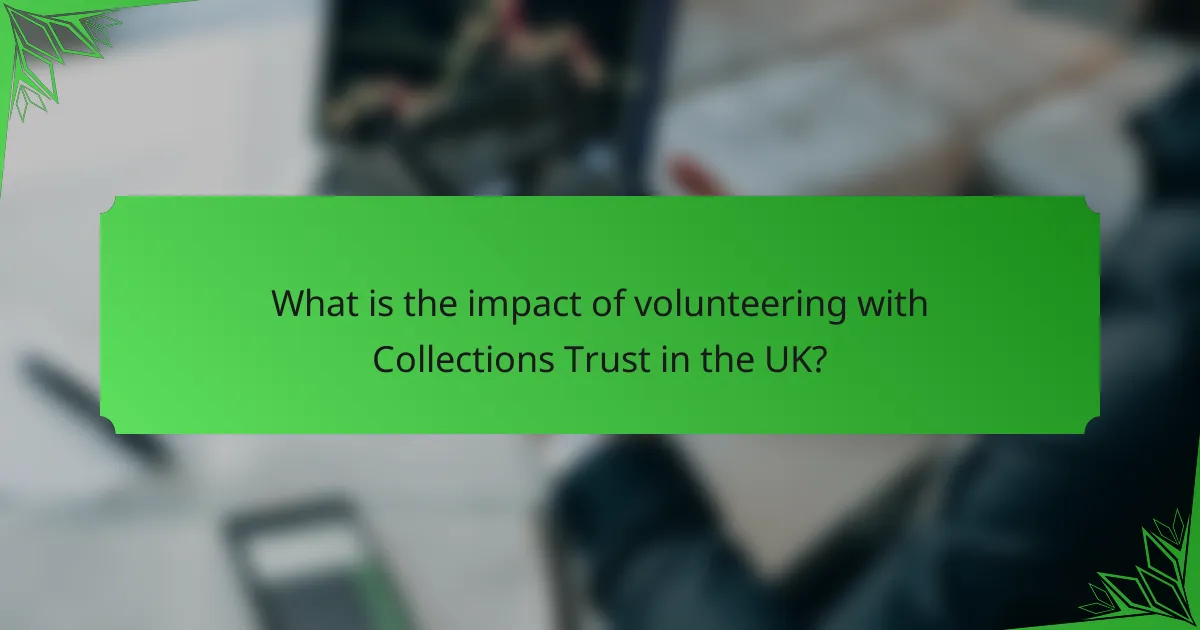
What is the impact of volunteering with Collections Trust in the UK?
Volunteering with Collections Trust in the UK significantly enhances community involvement, supports the preservation of local heritage, and provides valuable educational opportunities. These roles empower individuals to contribute meaningfully to their communities while fostering a deeper appreciation for cultural assets.
Enhances community engagement
Volunteers play a crucial role in fostering community engagement by organizing events, workshops, and exhibitions that bring people together. These activities not only promote awareness of local collections but also encourage participation from diverse groups, strengthening community bonds.
By volunteering, individuals can help create inclusive spaces that invite dialogue and collaboration among community members. This engagement can lead to increased attendance at cultural events and a greater sense of ownership over local heritage.
Supports local heritage preservation
Volunteering with Collections Trust directly contributes to the preservation of local heritage by assisting in the cataloging, conservation, and promotion of historical artifacts. Volunteers often work alongside professionals, gaining hands-on experience in heritage management and conservation techniques.
Through these efforts, volunteers help ensure that important cultural materials are maintained for future generations. This preservation work is vital for maintaining the unique identity of local communities across the UK.
Provides educational opportunities
Volunteers gain valuable educational experiences by participating in training sessions and workshops offered by Collections Trust. These opportunities allow individuals to develop skills in areas such as museum studies, archival practices, and public engagement strategies.
Additionally, volunteers often have the chance to share their knowledge with others, leading educational programs that inform the public about local history and collections. This reciprocal learning environment enriches both the volunteers and the community they serve.

What are the benefits of volunteering with Collections Trust?
Volunteering with Collections Trust offers numerous advantages, including personal growth, professional connections, and the chance to make a meaningful impact in the community. Engaging in this organization allows individuals to enhance their skills while contributing to valuable projects that support cultural heritage.
Skill development
Volunteers at Collections Trust can gain practical skills in areas such as project management, communication, and research. These experiences not only enhance resumes but also build confidence in various professional settings.
Additionally, volunteers may receive training in specific tools and techniques relevant to collections management, which can be beneficial for those pursuing careers in museums, galleries, or archives.
Networking opportunities
Volunteering provides a unique platform to connect with professionals and like-minded individuals in the cultural sector. This network can lead to mentorship opportunities, collaborations, and even job offers in the future.
Engaging with a diverse group of volunteers and staff fosters relationships that can be valuable throughout one’s career, as many connections in the arts and heritage sectors are built through shared experiences.
Contribution to community projects
By volunteering, individuals play a crucial role in community projects that preserve and promote local culture. These initiatives often require community input and support, making volunteers essential to their success.
Participation in such projects not only benefits the community but also allows volunteers to see the tangible results of their efforts, reinforcing the importance of cultural heritage and its impact on society.
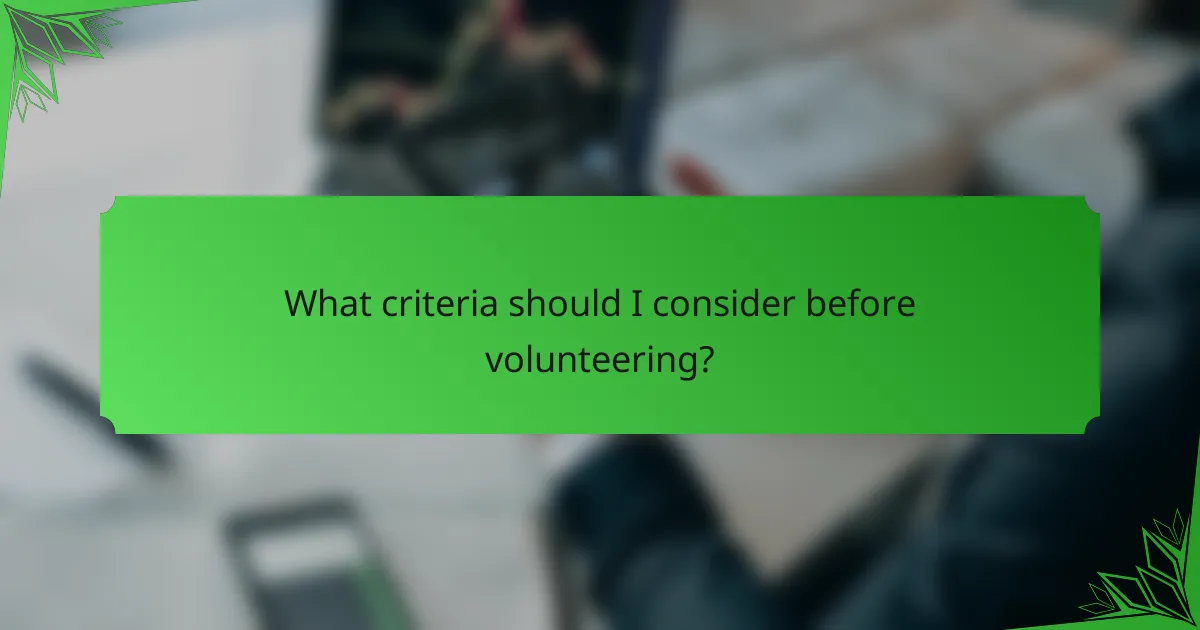
What criteria should I consider before volunteering?
Before volunteering, consider your availability, skills, and the location of the opportunity. These factors will help ensure that your contribution is meaningful and aligns with your personal circumstances and interests.
Time commitment
Assess how much time you can realistically dedicate to volunteering. Many organizations require a consistent commitment, which could range from a few hours a week to several days a month. Be honest about your schedule to avoid overcommitting.
Some roles may have flexible hours, while others might require attendance at specific events or meetings. Determine whether you prefer short-term projects or a longer-term engagement to find a suitable match.
Relevant skills and interests
Identify your skills and interests that can benefit the organization. For instance, if you have experience in administration, marketing, or community outreach, these skills can be valuable. Aligning your interests with the organization’s mission can enhance your volunteering experience.
Consider taking a skills inventory to better understand what you can offer. This can help you find a role that not only utilizes your strengths but also keeps you motivated and engaged.
Location and accessibility
Evaluate the location of the volunteer opportunity and its accessibility. If the organization is based in a specific city or region, ensure that you can easily reach it, whether by public transport or car. Accessibility for individuals with disabilities is also an important consideration.
Some organizations may offer remote volunteering options, which can be a great alternative if travel is a barrier. Look for opportunities that fit your logistical needs while allowing you to make a meaningful impact.
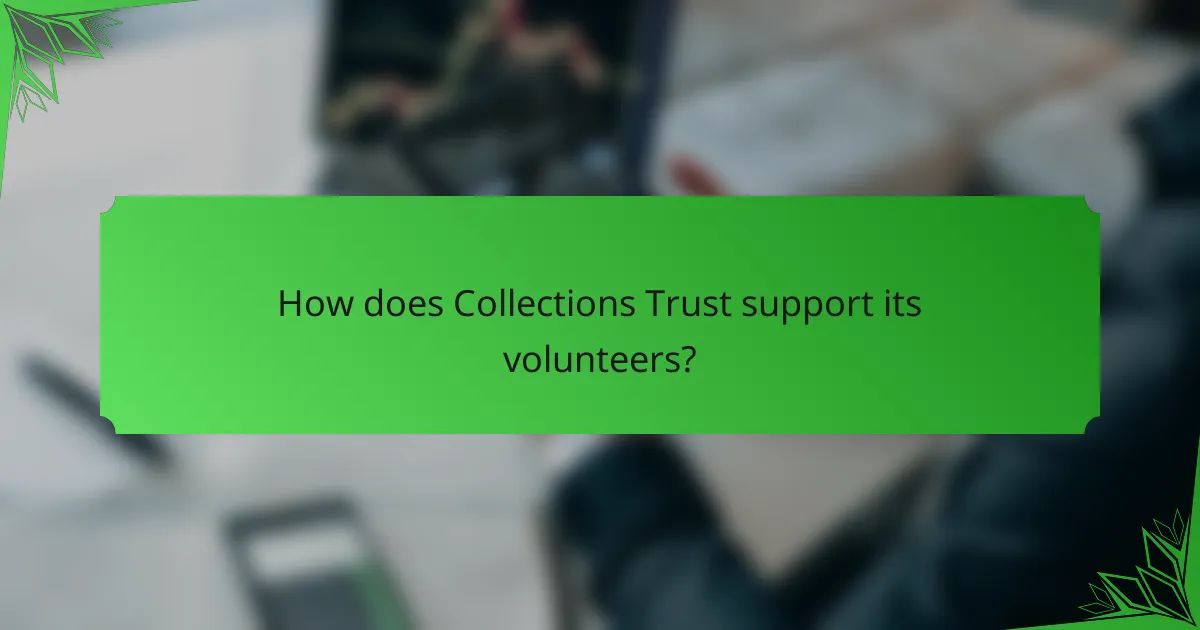
How does Collections Trust support its volunteers?
Collections Trust provides essential support to its volunteers through comprehensive training, resources, and community engagement initiatives. This ensures that volunteers are well-equipped to contribute effectively to the organization’s mission.
Training and resources
Collections Trust offers a variety of training programs designed to enhance the skills of its volunteers. These programs cover topics such as collections management, community outreach, and digital preservation, ensuring that volunteers are knowledgeable and confident in their roles.
In addition to training, volunteers have access to a wealth of resources, including online toolkits, guides, and best practice documents. These materials are regularly updated to reflect current standards and trends in the field, helping volunteers stay informed and effective.
To maximize the impact of their efforts, volunteers are encouraged to participate in peer networking events and workshops. These gatherings foster collaboration and allow volunteers to share experiences and strategies, ultimately strengthening the community’s overall effectiveness.






